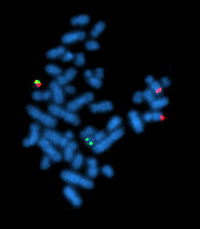
Photo from wikipedia
Mutations in the gene encoding isocitrate dehydrogenase 2 (IDH2) occur in several types of cancer, including acute myeloid leukemia (AML). In model systems, mutant IDH2 causes hematopoietic differentiation arrest. Enasidenib,… Click to show full abstract
Mutations in the gene encoding isocitrate dehydrogenase 2 (IDH2) occur in several types of cancer, including acute myeloid leukemia (AML). In model systems, mutant IDH2 causes hematopoietic differentiation arrest. Enasidenib, a selective small-molecule inhibitor of mutant IDH2, produces a clinical response in 40% of treated patients with relapsed/refractory AML by promoting leukemic cell differentiation. Here, we studied the clonal basis of response and acquired resistance to enasidenib treatment. Using sequential patient samples, we determined the clonal structure of hematopoietic cell populations at different stages of differentiation. Before therapy, IDH2-mutant clones showed variable differentiation arrest. Enasidenib treatment promoted hematopoietic differentiation from either terminal or ancestral mutant clones; less frequently, treatment promoted differentiation of nonmutant cells. Analysis of paired diagnosis/relapse samples did not identify second-site mutations in IDH2 at relapse. Instead, relapse arose by clonal evolution or selection of terminal or ancestral clones, thus highlighting multiple bypass pathways that could potentially be targeted to restore differentiation arrest. These results show how mapping of clonal structure in cell populations at different stages of differentiation can reveal the response and evolution of clones during treatment response and relapse.Mapping of the clonal structure of bone marrow cells in patients with acute myeloid leukemia treated with the IDH2 inhibitor enasidenib reveals heterogeneity in the cellular differentiation response and in mechanisms of relapse.
Journal Title: Nature Medicine
Year Published: 2018
Link to full text (if available)
Share on Social Media: Sign Up to like & get
recommendations!